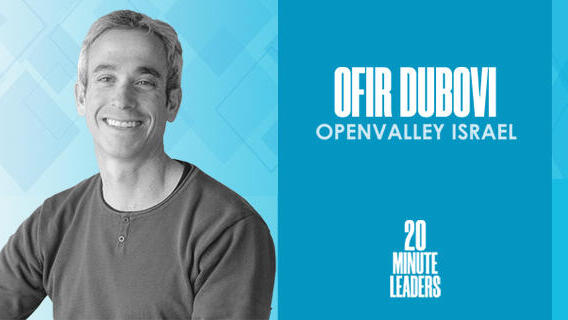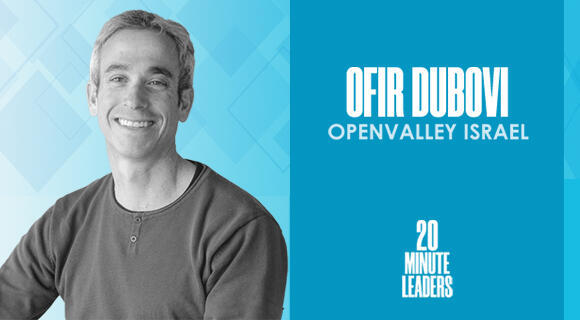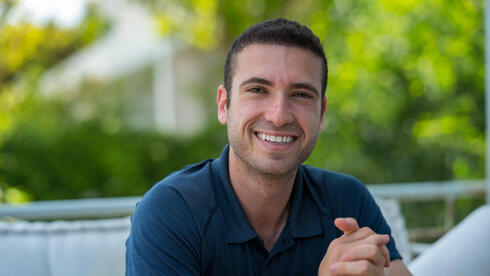
20-Minute Leaders
“Once we support our ecosystem becoming innovative, we are changing and impacting our surroundings.”
After holding leadership positions in prominent companies and going through an entrepreneurial journey, co-founder of OpenValley Israel Ofir Dubovi wanted to help other early-stage founders.
After holding leadership positions in prominent companies and going through an entrepreneurial journey, Ofir Dubovi wanted to help other early-stage founders. But he realized it was difficult to stay involved in the Tel Aviv ecosystem from his home in the Jezreel Valley. He felt like there was a startup city rather than a startup nation. He started meeting with entrepreneurs at his home and then hosted meetups for founders from northern Israel. Once those meetings grew, Dubovi established OpenValley Israel with the help of Yossi Ackerman. OpenValley offers physical space and support for early-stage startups at its branches and also helps build the ecosystem in the surrounding area. This includes making contacts with other industry players, teaching local organizations about innovation, and having a program for high schoolers. Dubovi explains that promoting innovation all around them builds the ecosystem and creates impact for the entire area.
Click Here For More 20MinuteLeaders
It's a pleasure having you here talking about extending the boundary of the startup nation. I'm excited to hear about your journey and your thesis.
I grew up in the northern part of Israel, in Haifa. I graduated high school in '89 and joined the army. After that, I worked very hard to complete my industrial management engineering. I started my career in the late ’90s. I worked for a company specialized with software testing, Tescom. I spent quite a few years over there. In 2001, I relocated with my wife to London. I managed the operation of this company in Europe. I completed my executive MBA in the London School of Economics.
In late 2003, we got back to Israel and I joined Amdocs. Later on, I joined NICE Systems. I became COO of part of the operation at NICE. In late 2007, I joined with two friends of mine back from high school, and we came up with the idea related to a data storage business. It was a rollercoaster like any startup. In late 2012, a strategic investor joined in. I did my personal transaction. I find myself in my prime time looking for something interesting to do. Before that, I moved with my family from the central part of Israel to the Jezreel Valley, Emeq Yizreʿel. We wanted to give our children a different environment, a different kind of education. Be closer to the soil.
In late 2012, I decided that I would like to bring my experience, my knowledge, and my capabilities to support early-stage entrepreneurs with their journey. I commuted on a daily basis from my small village in the Jezreel Valley to Tel Aviv. Why to Tel Aviv? Back then, approximately 93% of startups were based on a periphery of 12 kilometers around Herzliya Pituach and Tel Aviv. This is the ecosystem for startups. But after doing so on a daily basis, I really got tired of the commute.
Then you start understanding that, "If I'm away, I can't really participate in this eco chamber because it just doesn't work. I need to find a solution for that."
Everyone calls us a startup nation. But in my experience, it was actually a startup city. There are tens of thousands of people who decide to come and build houses and educate their kids in this part of the country. But at the same time, if they would like to become an entrepreneur, they need to commute.
I asked myself, "How come a startup established in the Jezreel Valley will be less successful compared to a startup that is actually established on Rothschild Boulevard or in other places in Tel Aviv?" I continued conducting those meetings with early-stage entrepreneurs, but I did it at my home. Entrepreneurs who are looking for funding, they will commute anywhere. But I was exposed more and more to entrepreneurs from the northern part of Israel, in general. Specifically, the Jezreel Valley.
I realized that those who live in the northern part of Israel and managed to gather seed money then thought, "Now we need to consider future rounds, so we need to get close to the VCs. We need to recruit talent." So they took the car and drove to Tel Aviv.
You had sort of a solution. But it was short-lived because all it did was delay the inevitable of having to move to the more centralized location.
Yeah, definitely. I then realized that the main reason that there wasn't a real community for startups in this part of Israel is the fact that we are lacking an ecosystem for them. How come Tel Aviv became one of the leading ecosystems for entrepreneur startups? The ecosystem was derived and built from various entities, the financial players, the VCs and the banks, service providers, academy, government, and municipals. It's about networking, how you connect between those entities and put them together. This is exactly what I started to do back then with a group of people. We started to establish a community and meet on a monthly basis. But the community started to establish from one meeting to another, and there were more and more people joining. I realized that there is enough talent and raw material in this area in order to move to the next stage. We established a place that will gather all of those entrepreneurs and support them with the endeavor of establishing their own startup.
But I realized, for that, I will need to invest a lot, put in the contacts, and build the ecosystem. So I looked for a co-founder. I was lucky enough to knock on the door of a veteran in the Israeli industry who lived in the village across from mine, Yossi Ackerman. He was a CEO and president of Elbit Systems for almost 20 years. I didn't know him personally. I got his contact, and I did a cold call. I came with my pitch. After two sentences about my dream, Yossi stopped me and said, "Ofir, I'm in. I feel the same way. Let's start to do some impact around here."
In January, 2016, we established our first branch of OpenValley in Ramat Yishai, which is in the heart of the Jezreel Valley. We decided two main, let's say, rules for us. First of all, the inhabitants of OpenValley will be entrepreneurs and startups. OpenValley is not a real estate business.
Why not allow the companies that maybe aren't early-stage startups to join in?
Because we realized that in order for us to establish a community for entrepreneurs and startups, we really need to gather them together. All kinds of startups. Although most of our startups, and today we have more than 150 startups in our chain, are basically technological startups. In order to establish this unique community, we have to focus on this type of DNA. Entrepreneurs and startups.
The second rule is we decided that our main KPI is to make sure that those startups will be successful. That means that our mindset, our efforts, our contact, our networking, and also our money were focused toward those startups. After Ramat Yishai, we established a very large branch in Caesarea. And later, in Yokneam. And just recently, in Ramat HaGolan. And in a few months, hopefully we'll establish our first location south of Tel Aviv in Ashdod. It was mainly a focus to establish the ecosystem by putting together those entities that I mentioned, together with the startups, and support them not only with funding but also with expanding and opening themselves to markets, to potential customers, and all kinds of support that startups very much need.
It sounds like an amazing natural progression. But beyond that, it sounds like you're very fulfilled with the mission that you're on.
Yeah. OpenValley is not an NGO. We are based on business rules. And throughout the time, we built a few layers to our business. We do have the layer of like any other coworking space of the real estate part. But we also established an academy for innovation and entrepreneurship. The industry, the corporates, the government, municipals, and NGOs asked us to help them to develop their own entrepreneurship. Four or five years ago, we established an Academy for Innovation. We also developed a six year program for high school students for entrepreneurship and innovation. All of this, I consider part of establishing the ecosystem. Because once we support our ecosystem becoming innovative, we are changing and we're impacting our surroundings. We put together the contacts between our startups and the industry. It's very, very important for them. We do scouting for many corporates and put them in touch with startups in OpenValley. So our day-to-day is mainly how to establish and develop the ecosystem surrounding places that we decide to invest in.
Michael Matias, Forbes 30 Under 30, is a Venture Fellow at Innovation Endeavors as well as investment Venture Partner at Secret Chord and J-Ventures. He studies Artificial Intelligence and Human-Computer Interaction at Stanford University, and was an engineer at Hippo Insurance. Matias previously served as an officer in the 8200 unit. 20MinuteLeaders is a tech entrepreneurship interview series featuring one-on-one interviews with fascinating founders, innovators and thought leaders sharing their journeys and experiences.
Contributing editors: Michael Matias, Megan Ryan

